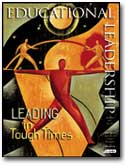All people see themselves as leaders in their own minds,” says Scout Baier, a 7th grader at Ethan Allen School in Coolidge, Vermont.“I mean that when you are alone, you know you are a leader in your own way.”
Scout's insight into the nature of leadership suggests that she has been thinking about this topic for some time. In fact, Scout is a student leader at her school, although she has never run for office and she doesn't consider herself to be any different from her peers. She belongs to a student club at Ethan Allen that differs from most leadership clubs.
First, membership is open to any student who participates in a manner consistent with the school's Core Values—Responsibility, Respect, and Relationships. Second, the club's purpose is to transform the way in which the Ethan Allen community educates students. With this goal in mind, the club persuaded the Parent-Teacher Organization to rename itself the Student-Teacher-Parent Organization. Then the club convinced the school board to expand its membership to include two students, who now attend every school board meeting. In addition, the student club collaborated with the school maintenance staff and a local waste management company to spearhead a schoolwide recycling program. It has also organized a food drive for the local community food bank; as a result of the students' efforts, residents can now drop off canned goods when they vote on the town and school budgets.
Ethan Allen—a preK-8 school serving 850 students, 35 percent of whom qualify for free or reduced-price lunch—is one of many schools in Vermont and throughout the United States that are actively committed to fostering democratic learning communities in which all individuals, students and adults alike, are respected. As consultants working with the Foundation for Excellent Schools, a national nonprofit organization that partners with high-need schools, my colleagues and I have been encouraging students to build their leadership capacity for participation in such communities. The student club responsible for these initiatives began when we convened a focus group of randomly selected Ethan Allen students to discuss their perspectives on what their ideal school might look like and how they might take collaborative action to realize their ideal. We have learned much from listening to students on the twin subjects of leadership and school communities.
Student Perspectives
After the student leadership club at Ethan Allen School collated the results of a survey on school climate that it had created and administered to all middle school students, club members presented the findings at a faculty meeting. The survey found that although students generally liked their teachers and appreciated being held to high academic standards, they wanted more hands-on learning and more-meaningful homework. The faculty, modeling the school's Core Values, listened carefully as club members explained that students wanted exactly what teachers wanted: a community that was respectful of all relationships, a community in which all individuals had a voice, and a community in which classes and academic work were both engaging and intentional.
Mark Kelly, an 8th grader, says that he and other students are trying to achieve abetter environment between teachers and students so we'll have a better understanding of one another. That leads to a better learning environment.
Currently, students and teachers in the Ethan Allen community are completing a revised school action plan that will take into account not only the various mandated instructional focuses but also the voice of students.
The sense of shared purpose that these students have engendered among various stakeholders demonstrates the value of providing students with substantive opportunities to share in decision making. Students have a singular perspective on schools and schooling—a perspective that is essential for parents, educators, and policymakers to understand. In part because they stand to benefit immediately, students are motivated by a desire to transform their schools into the kind of learning communities they instinctively know would best serve their needs.
The lucidity of students' comments on what they experience at school and their insights into how school could better serve their needs should surprise no one. After all, students have always had a vested interest in their education—but they rarely get the chance to affect what and how schools teach.
Leadership Skills and Characteristics
In our role as advisors, my colleagues and I have identified two crucial skills that enable students to develop not only the aptitudes but also the attitudes necessary for them to become leaders in their school learning communities. By encouraging the development of listening and consensus-building skills, schools can harness the myriad resources of their students and, as Scout puts it, “get more and more students involved.”
Listening
To engage in collaboration, individuals must practice listening. The ability to listen considerately to a variety of diverse opinions and reflect accurately on what the speakers have said is the first step in sharing authority. Listening is the foundation of democratic participation; it encourages inclusiveness and respect.
Perhaps as a result of having been excluded from most decisions that directly affect them, students are implicitly aware of the symbiotic relationship between listening and respect. In discussing her mentor relationship with a 2nd grader, Emily Anderson, a 6th grader at Catamount Union in Sugar Bush, Vermont, clearly articulates her sense of individual and communal accountability:I listen to her and care about being with her. I respect her. If I didn't, she wouldn't respect me.
Consensus Building
Another necessary skill is the ability to facilitate conversations—to elicit input, to objectively reflect on what has been contributed, to provide feedback, and to craft consensus. For Eliza Davis, a 6th grader at Catamount Union, the process of reaching consensus is the real challenge of facilitation. Like most students, however, she is optimistic about ultimately identifying common ground:You have to come to a mutual agreement. If everyone has different ideas, only by compromising can you figure out what everyone wants to do.
Leadership Redefined
Leadership defined by inclusivity and collaboration clearly represents a new way of thinking. The traditional view of leadership assumes that leaders have followers—that leaders possess characteristics and skills that separate them from everyone else. Teachers lead students, principals lead teachers, central office administrators lead principals, school boards lead central office administrators, and so on.
Such a linear definition of leadership is anachronistic at best and alienating at worst. The new democratic model of leading that these students are practicing is less about the power of the individual than it is about the power of the people, less about leadership than about what we call leaderful action—a model of leadership that celebrates advocacy, champions collaboration, encourages facilitation, embraces creativity, promotes sustainability, and fosters personal responsibility for civic engagement.
If Scout's belief—that all of us are leaders when we're alone—is accurate, then it follows that we all have the capacity for leaderful action. One reason we may not be actively leading is that we lack the skills that enable us to express our personal initiative. Another reason is that we may never be asked—or that we do not demand the right—to share in the conversation. And still another reason might be that we are accustomed to the conventional definition of leadership, with its presumption of individuality and exclusivity.
Through our work with students in a number of schools, we have found that students are eager to serve as role models in leading change once they have been empowered by a learning community that acknowledges their sense of individual responsibility and facilitates the acquisition of leadership skills. Given the opportunity, students quickly demonstrate their potential for leadership by undertaking advocacy in various forms—as ambassadors, action researchers, mentors, academic architects, volunteers, education consultants, advisors, fund-raisers, and translators—as well as by taking on a variety of other responsibilities that further the collaborative ideals of their communities.
The students at Ethan Allen, for example, demonstrated their ability to serve as savvy researchers when they created, administered, and collated the results from their survey on school climate. These students used the survey results to provide their teachers with useful information about student views. The finding that 77 percent of students felt cheated when their homework was not graded stimulated a compelling conversation about the purposes and validity of homework. As a result, teachers agreed to assign more project-based homework that enables students to choose a specific area of interest and pursue that interest over the course of the unit.
Providing students with a variety of opportunities encourages motivation. When students can exert their leadership skills in meaningful contexts, they take the initiative, not because it will bring them more votes in the race for student council or because their parents will applaud them, but because they know that they can make a difference in their own lives and in the lives of their communities.
The Power of Idealism
As all educators know (although some may occasionally forget), one of the real pleasures of working with students is that they are genuinely idealistic. They believe that they can make a difference in the world, that they can make the world a better place. As educators, we have a responsibility to do everything we can to ensure that students never lose that sense of buoyant confidence in the power of their voices.
For all of us, the first step in undertaking an agenda of transformation is to believe that what we set out to do is possible. As Don Morrison, an Ethan Allen 8th grader, said when talking about how to improve his school,You need optimism and lots of it to believe that you'll get things done and that you'll be able to change things.
With that optimism, a commitment to a democratic learning community, and a community that fosters leaderful action, we can nurture the idealism of such students as Scout, Mark, Emily, Eliza, and Don and ensure that their voices are heard. Our schools and our world will become better places if we listen.

